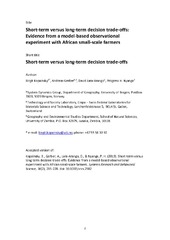Short-term versus long-term decision trade-offs: Evidence from a model-based observational experiment with African small-scale farmers
Peer reviewed, Journal article
Accepted version
Permanent lenke
https://hdl.handle.net/1956/22081Utgivelsesdato
2019Metadata
Vis full innførselSamlinger
- Department of Geography [634]
Originalversjon
Systems research and behavioral science. 2019;36(2):215-228 https://doi.org/10.1002/sres.2582Sammendrag
Smallholder farmers in sub‐Saharan Africa recurrently face situations of complex and dynamic decision trade‐offs. Short‐term‐oriented activities such as fertilizer application help to cover immediate food needs but compromise on future food production. Long‐term‐oriented production activities such as building up soil fertility are important systemic leverage points; however, they compromise on today's harvests. This article uses a semicomputerized observational experiment in Zambia to investigate farm management decision making with conflicting production objectives in a dynamic context. The results reveal that, overall, Zambian smallholder farmers have a strong and significant preference for short‐term‐oriented production activities, which leads to a suboptimal performance in production in the long term. A mind shift towards more long‐term‐oriented production activities is required to sustainably increase food production. Our findings point at two things in this regard: First, we identify decision rules that successful performers have applied and that should be the basis for capacity building strategies. Second, we indicate that our approach itself contributed to recognition of the importance of a longer term perspective.
